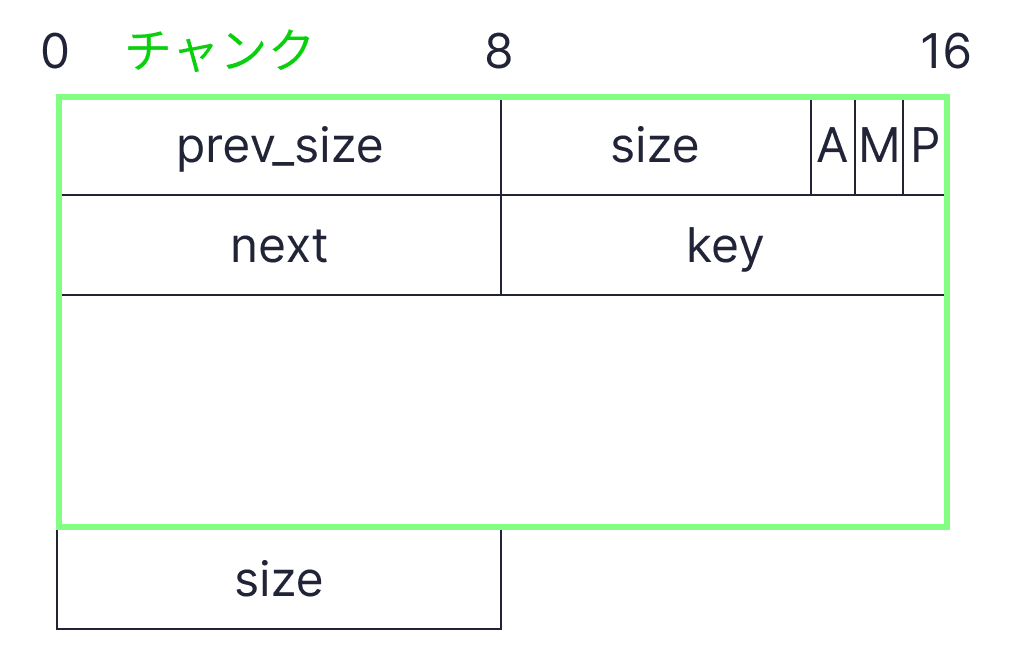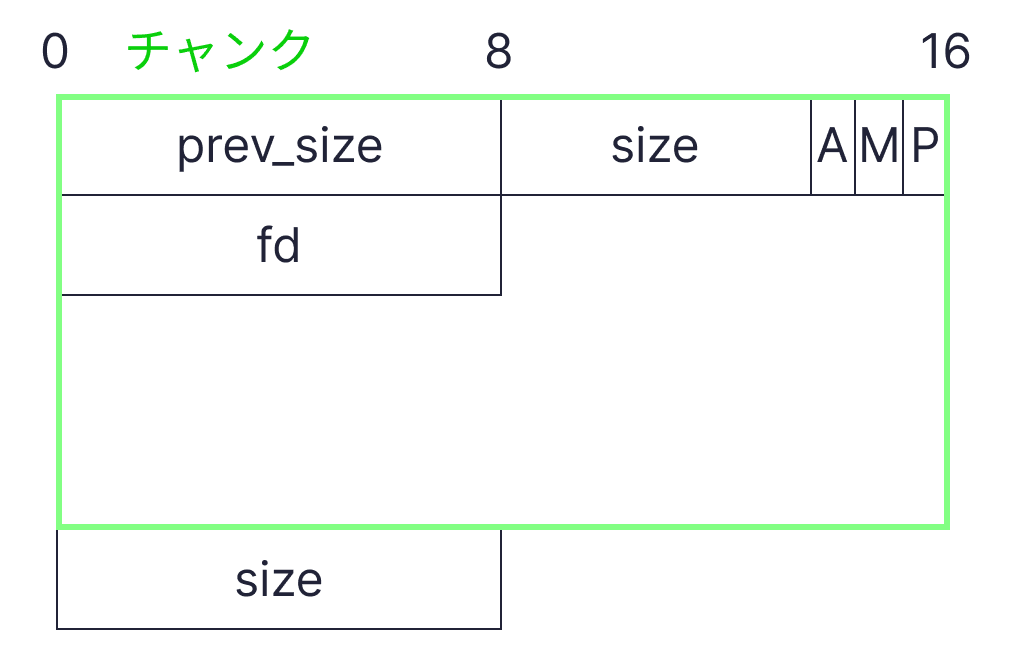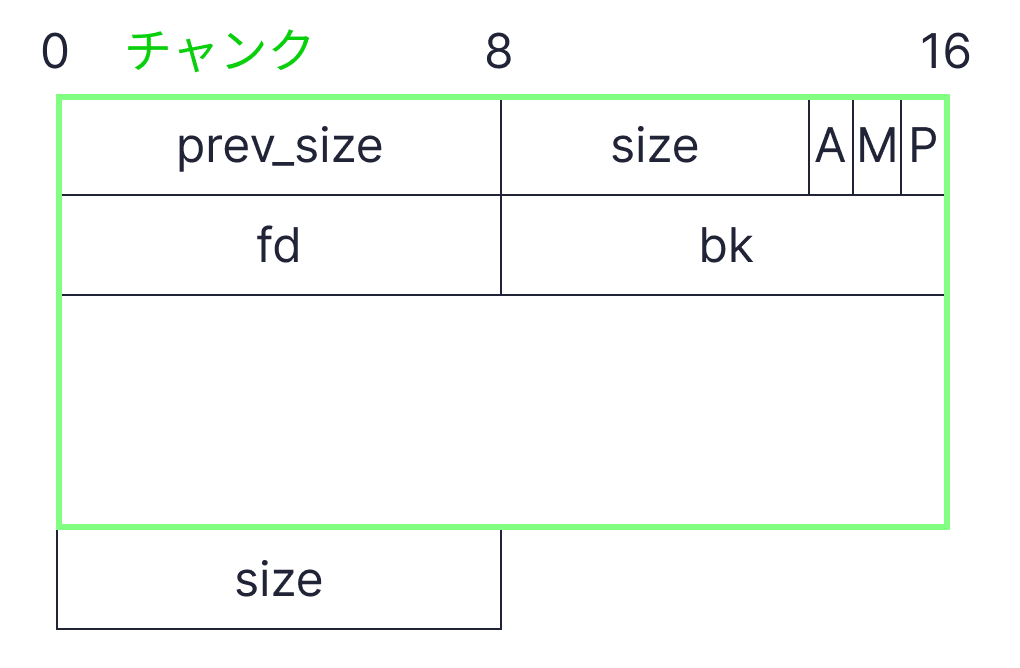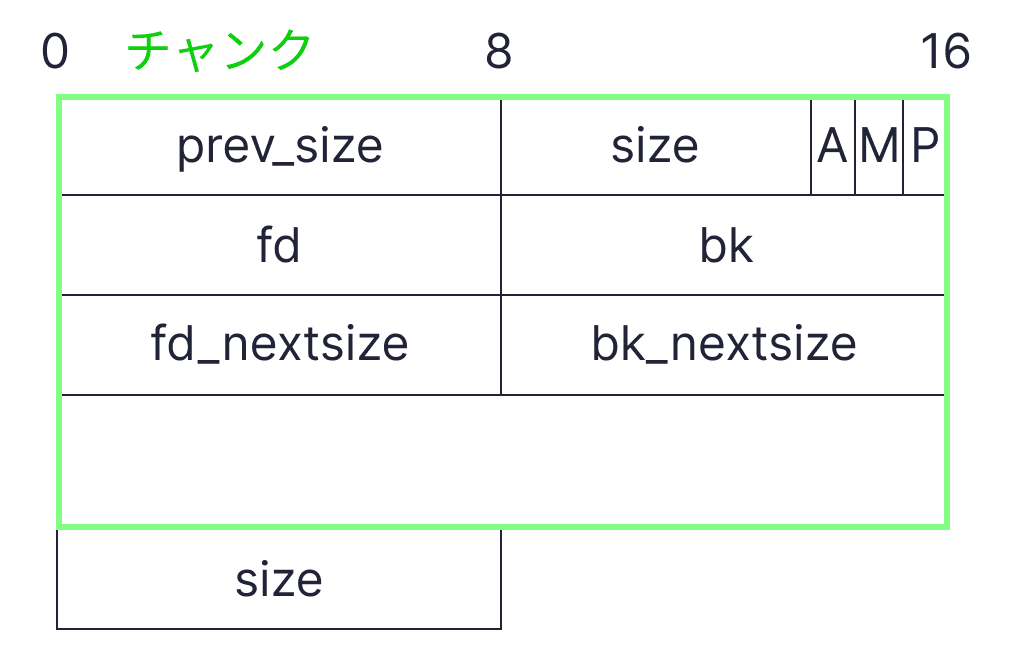malloc.c を読む (bins)
malloc() は動的にメモリを確保して free() で開放してくれます。
void *malloc(size_t size);
void free(void *ptr);
このシリーズではこれらの関数が内部でどのように処理されるのかを調べていきます。
前回全体像を把握しましたが今回は各 bins の処理を中心に調べていきます。
ここで扱う glibc のバージョンは v2.38 です。また glibc のソースコードはブラウザ上で読むことができます。
- https://elixir.bootlin.com/glibc/latest/source/malloc/malloc.c
- https://codebrowser.dev/glibc/glibc/malloc/malloc.c.html
bins とは
free list の正体は bins と呼ばれるリスト群です。bins はいくつかの種類があってサイズによって管理の仕方を変えることで最適化しています。
| bins の種類 | チャンクサイズ (default) | 説明 | データ構造 |
|---|---|---|---|
| tcache bins | 0x20 ~ 0x410 | 最近アクセスしたチャンクが入れられる bins | 単方向リスト |
| fastbins | 0x20 ~ 0x80 | 頻繁に確保・解放されるような小さなチャンクを管理する bins | 単方向リスト |
| unsortedbin | 0x20 ~ | tcache bins や fastbins では扱えないものを入れて smallbins や largebins に渡す前に一時的に管理する bin | 双方向リスト |
| smallbins | 0x20 ~ 0x3f0 | 小さなチャンクを管理する bins | 双方向リスト |
| largebins | 0x400 ~ | 大きなチャンクを管理する bins | 双方向リスト + スキップリスト |
各 bins の管理
入り口から free list を理解した方が分かりやすそうなので、まだチャンクには触らずに各 bins の管理方法を紹介します。
bins によって管理されている場所はそれぞれ異なり、次のようにまとめられます。
| bins の種類 | 管理先 |
|---|---|
| tcache bins | tcache |
| fastbins |
arena->fastbinsY arena->have_fastchunks
|
| unsortedbin, smallbins, largebins |
arena->bins arena->binmap
|
これらがどう管理しているかを最新の glibc ソースコードに倣いながら紐解いていきます。
前提知識として各 bin のデータ構造は単方向リストと双方向リストの 2 つがあります。それぞれの挿入 (link) や削除 (unlink) の処理は理解している前提で話を進めます。
- 単方向リストは単方向にしか移動できない繋ぎ変えが簡単な高速なリストです。LIFO で先頭は arena で管理されています。チャンクのデータ部分の先頭 8 バイトは forward pointer (fd) として使われ、次のチャンクのポインターが格納されています。末尾の fd は NULL になります。
- 双方向リストは双方向移動できる円形のリストです。FIFO で先頭と末尾は arena で管理されていて、チャンクのデータ部分の先頭 16 バイトは forward pointer (fd), back pointer (bk) として使われます。
tcache
tcache bins の実体である tcache_perthread_struct 構造体 (0x280 bytes) の tcache は各スレッドにおいて _int_malloc() でヒープ上に確保されます。ヒープを利用したバイナリを起動すると始めから size が 0x291 のチャンクがあるのはこの為です。
/* We want 64 entries. This is an arbitrary limit, which tunables can reduce. */
# define TCACHE_MAX_BINS 64
# define MAX_TCACHE_SIZE tidx2usize (TCACHE_MAX_BINS-1)
/* Only used to pre-fill the tunables. */
# define tidx2usize(idx) (((size_t) idx) * MALLOC_ALIGNMENT + MINSIZE - SIZE_SZ)
/* When "x" is from chunksize(). */
# define csize2tidx(x) (((x) - MINSIZE + MALLOC_ALIGNMENT - 1) / MALLOC_ALIGNMENT)
/* When "x" is a user-provided size. */
# define usize2tidx(x) csize2tidx (request2size (x))
/* With rounding and alignment, the bins are...
idx 0 bytes 0..24 (64-bit) or 0..12 (32-bit)
idx 1 bytes 25..40 or 13..20
idx 2 bytes 41..56 or 21..28
etc. */
/* This is another arbitrary limit, which tunables can change. Each
tcache bin will hold at most this number of chunks. */
# define TCACHE_FILL_COUNT 7
/* Maximum chunks in tcache bins for tunables. This value must fit the range
of tcache->counts[] entries, else they may overflow. */
# define MAX_TCACHE_COUNT UINT16_MAX
typedef struct tcache_entry
{
struct tcache_entry *next; // 次の tcache_entry へのポインタ
struct tcache_perthread_struct *key; // 乱数を用いて double free を検知
} tcache_entry;
typedef struct tcache_perthread_struct
{
uint16_t counts[TCACHE_MAX_BINS]; // 各 bin の長さの一覧
tcache_entry *entries[TCACHE_MAX_BINS]; // 各 bin の最初の tcache へのポインタの一覧
} tcache_perthread_struct;
static __thread bool tcache_shutting_down = false;
static __thread tcache_perthread_struct *tcache = NULL;
static uintptr_t tcache_key;
これを読むと TCACHE_MAX_BINS == 64 よりチャンクサイズがそれぞれ 0x20 ~ 0x410 の 64 種類の tcache bin が作られていて tcache_perthread_struct 構造体の entries では各 tcache bin の先頭のアドレスが書き込まれており、ここからチャンクを link / unlink します。そして counts でリストの長さを管理し、7 個になったら受け付けないようにしています。
tcache bins に入っているチャンクの方については tcache_entry 構造体が overlap されていて next が単方向リストの次のポインタを指し、key に共通の乱数 tcache_key を書き込むことで 2 度目の free() で tcache_key か判定することで double free を検知しています。
具体的には次のように実装されています。特に難しいことは書かれてないと思います。
/* The value of tcache_key does not really have to be a cryptographically
secure random number. It only needs to be arbitrary enough so that it does
not collide with values present in applications. If a collision does happen
consistently enough, it could cause a degradation in performance since the
entire list is checked to check if the block indeed has been freed the
second time. The odds of this happening are exceedingly low though, about 1
in 2^wordsize. There is probably a higher chance of the performance
degradation being due to a double free where the first free happened in a
different thread; that's a case this check does not cover. */
static void
tcache_key_initialize (void)
{
if (__getrandom (&tcache_key, sizeof(tcache_key), GRND_NONBLOCK)
!= sizeof (tcache_key))
{
tcache_key = random_bits ();
#if __WORDSIZE == 64
tcache_key = (tcache_key << 32) | random_bits ();
#endif
}
}
/* Caller must ensure that we know tc_idx is valid and there's room
for more chunks. */
static __always_inline void
tcache_put (mchunkptr chunk, size_t tc_idx)
{
tcache_entry *e = (tcache_entry *) chunk2mem (chunk);
/* Mark this chunk as "in the tcache" so the test in _int_free will
detect a double free. */
e->key = tcache_key;
e->next = PROTECT_PTR (&e->next, tcache->entries[tc_idx]);
tcache->entries[tc_idx] = e;
++(tcache->counts[tc_idx]);
}
/* Caller must ensure that we know tc_idx is valid and there's
available chunks to remove. */
static __always_inline void *
tcache_get (size_t tc_idx)
{
tcache_entry *e = tcache->entries[tc_idx];
if (__glibc_unlikely (!aligned_OK (e)))
malloc_printerr ("malloc(): unaligned tcache chunk detected");
tcache->entries[tc_idx] = REVEAL_PTR (e->next);
--(tcache->counts[tc_idx]);
e->key = 0;
return (void *) e;
}
static void
tcache_thread_shutdown (void)
{
int i;
tcache_perthread_struct *tcache_tmp = tcache;
tcache_shutting_down = true;
if (!tcache)
return;
/* Disable the tcache and prevent it from being reinitialized. */
tcache = NULL;
/* Free all of the entries and the tcache itself back to the arena
heap for coalescing. */
for (i = 0; i < TCACHE_MAX_BINS; ++i)
{
while (tcache_tmp->entries[i])
{
tcache_entry *e = tcache_tmp->entries[i];
if (__glibc_unlikely (!aligned_OK (e)))
malloc_printerr ("tcache_thread_shutdown(): "
"unaligned tcache chunk detected");
tcache_tmp->entries[i] = REVEAL_PTR (e->next);
__libc_free (e);
}
}
__libc_free (tcache_tmp);
}
static void
tcache_init(void)
{
mstate ar_ptr;
void *victim = 0;
const size_t bytes = sizeof (tcache_perthread_struct);
if (tcache_shutting_down)
return;
arena_get (ar_ptr, bytes);
victim = _int_malloc (ar_ptr, bytes);
if (!victim && ar_ptr != NULL)
{
ar_ptr = arena_get_retry (ar_ptr, bytes);
victim = _int_malloc (ar_ptr, bytes);
}
if (ar_ptr != NULL)
__libc_lock_unlock (ar_ptr->mutex);
/* In a low memory situation, we may not be able to allocate memory
- in which case, we just keep trying later. However, we
typically do this very early, so either there is sufficient
memory, or there isn't enough memory to do non-trivial
allocations anyway. */
if (victim)
{
tcache = (tcache_perthread_struct *) victim;
memset (tcache, 0, sizeof (tcache_perthread_struct));
}
}
fastbinsY
fastbins は arena にある fastbinsY have_fastchunks によって管理されています。
fastbinsY では各チャンクサイズに対応する fastbin のリストの先頭ポインタが格納されています。チャンクサイズは次のソースを読むと MAX_FAST_SIZE == 0xa0 より 0x20 ~ 0xa0 の 9 種類の fastbin が用意されてあるのですが、実際には global_max_fast == DEFAULT_MXFAST == 0x80 より 0x20 ~ 0x80 の 7 種類を使います。
また malloc_consolidation() で fastbins を統合し、unsortedbin に link するのですが、 have_fastchunks で fastbins 内にチャンクが入っているかどうかの bool 値を書き込むことで高速化しています。
#define DEFAULT_MXFAST (64 * SIZE_SZ / 4)
typedef struct malloc_chunk *mfastbinptr;
#define fastbin(ar_ptr, idx) ((ar_ptr)->fastbinsY[idx])
/* offset 2 to use otherwise unindexable first 2 bins */
#define fastbin_index(sz) \
((((unsigned int) (sz)) >> (SIZE_SZ == 8 ? 4 : 3)) - 2)
/* The maximum fastbin request size we support */
#define MAX_FAST_SIZE (80 * SIZE_SZ / 4)
#define NFASTBINS (fastbin_index (request2size (MAX_FAST_SIZE)) + 1)
#define FASTBIN_CONSOLIDATION_THRESHOLD (65536UL)
static uint8_t global_max_fast;
#define set_max_fast(s) \
global_max_fast = (((size_t) (s) <= MALLOC_ALIGN_MASK - SIZE_SZ) \
? MIN_CHUNK_SIZE / 2 : ((s + SIZE_SZ) & ~MALLOC_ALIGN_MASK))
struct malloc_state
{
...
int have_fastchunks; // fastbins が空ではないことを表す真偽値
mfastbinptr fastbinsY[NFASTBINS]; // fastbins の先頭が格納されている
...
};
static void
malloc_init_state (mstate av)
{
int i;
mbinptr bin;
/* Establish circular links for normal bins */
for (i = 1; i < NBINS; ++i)
{
bin = bin_at (av, i);
bin->fd = bin->bk = bin;
}
#if MORECORE_CONTIGUOUS
if (av != &main_arena)
#endif
set_noncontiguous (av);
if (av == &main_arena)
set_max_fast (DEFAULT_MXFAST);
atomic_store_relaxed (&av->have_fastchunks, false);
av->top = initial_top (av);
}
ちなみに fastbins が max_fast を変更するときには先に malloc_consolidate() を呼んで main_arena の fastbins を空にしておくことが前提条件となっているようです。
bins
bins は free list の中で双方向リスト (unsortedbin / smallbins / largebins) を扱う bin の先頭・末尾を格納する配列です。
全部で 128 個の bins があって、あるサイズ範囲ごとに保持されています。事実、小さいほど頻繁に、大きいほど稀に malloc されることが知られている為、サイズが大きくなるに連れて指数的に間隔を大きくすることで効率的に管理することができます。比較的小さいチャンクは smallbins に挿入されます。smallbins は 1 つの bin が扱うチャンクサイズは 1 通りだけになっていて、just-fit で割り当てられます。一方比較的大きなチャンクは largebins に挿入されます。largebins は 1 つの bin が扱うチャンクサイズは複数あり、サイズ順にソートされています。
同じサイズのチャンクは、最近解放されたものを先頭にリンクされ、割り当ては後ろから行われます。 この結果、LRU (FIFO) 割り当て順となり、各チャンクに隣接する解放されたチャンクと連結される機会が均等に与えられる傾向があるため、空きチャンクが大きくなり、断片化が少なくなります。
typedef struct malloc_chunk *mbinptr;
/* addressing -- note that bin_at(0) does not exist */
#define bin_at(m, i) \
(mbinptr) (((char *) &((m)->bins[((i) - 1) * 2])) \
- offsetof (struct malloc_chunk, fd))
/* analog of ++bin */
#define next_bin(b) ((mbinptr) ((char *) (b) + (sizeof (mchunkptr) << 1)))
/* Reminders about list directionality within bins */
#define first(b) ((b)->fd)
#define last(b) ((b)->bk)
/*
Indexing
Bins for sizes < 512 bytes contain chunks of all the same size, spaced
8 bytes apart. Larger bins are approximately logarithmically spaced:
64 bins of size 8
32 bins of size 64
16 bins of size 512
8 bins of size 4096
4 bins of size 32768
2 bins of size 262144
1 bin of size what's left
There is actually a little bit of slop in the numbers in bin_index
for the sake of speed. This makes no difference elsewhere.
The bins top out around 1MB because we expect to service large
requests via mmap.
Bin 0 does not exist. Bin 1 is the unordered list; if that would be
a valid chunk size the small bins are bumped up one.
*/
#define NBINS 128
#define NSMALLBINS 64
#define SMALLBIN_WIDTH MALLOC_ALIGNMENT
#define SMALLBIN_CORRECTION (MALLOC_ALIGNMENT > CHUNK_HDR_SZ)
#define MIN_LARGE_SIZE ((NSMALLBINS - SMALLBIN_CORRECTION) * SMALLBIN_WIDTH)
#define in_smallbin_range(sz) \
((unsigned long) (sz) < (unsigned long) MIN_LARGE_SIZE)
#define smallbin_index(sz) \
((SMALLBIN_WIDTH == 16 ? (((unsigned) (sz)) >> 4) : (((unsigned) (sz)) >> 3))\
+ SMALLBIN_CORRECTION)
#define largebin_index_32(sz) \
(((((unsigned long) (sz)) >> 6) <= 38) ? 56 + (((unsigned long) (sz)) >> 6) :\
((((unsigned long) (sz)) >> 9) <= 20) ? 91 + (((unsigned long) (sz)) >> 9) :\
((((unsigned long) (sz)) >> 12) <= 10) ? 110 + (((unsigned long) (sz)) >> 12) :\
((((unsigned long) (sz)) >> 15) <= 4) ? 119 + (((unsigned long) (sz)) >> 15) :\
((((unsigned long) (sz)) >> 18) <= 2) ? 124 + (((unsigned long) (sz)) >> 18) :\
126)
#define largebin_index_32_big(sz) \
(((((unsigned long) (sz)) >> 6) <= 45) ? 49 + (((unsigned long) (sz)) >> 6) :\
((((unsigned long) (sz)) >> 9) <= 20) ? 91 + (((unsigned long) (sz)) >> 9) :\
((((unsigned long) (sz)) >> 12) <= 10) ? 110 + (((unsigned long) (sz)) >> 12) :\
((((unsigned long) (sz)) >> 15) <= 4) ? 119 + (((unsigned long) (sz)) >> 15) :\
((((unsigned long) (sz)) >> 18) <= 2) ? 124 + (((unsigned long) (sz)) >> 18) :\
126)
// XXX It remains to be seen whether it is good to keep the widths of
// XXX the buckets the same or whether it should be scaled by a factor
// XXX of two as well.
#define largebin_index_64(sz) \
(((((unsigned long) (sz)) >> 6) <= 48) ? 48 + (((unsigned long) (sz)) >> 6) :\
((((unsigned long) (sz)) >> 9) <= 20) ? 91 + (((unsigned long) (sz)) >> 9) :\
((((unsigned long) (sz)) >> 12) <= 10) ? 110 + (((unsigned long) (sz)) >> 12) :\
((((unsigned long) (sz)) >> 15) <= 4) ? 119 + (((unsigned long) (sz)) >> 15) :\
((((unsigned long) (sz)) >> 18) <= 2) ? 124 + (((unsigned long) (sz)) >> 18) :\
126)
#define largebin_index(sz) \
(SIZE_SZ == 8 ? largebin_index_64 (sz) \
: MALLOC_ALIGNMENT == 16 ? largebin_index_32_big (sz) \
: largebin_index_32 (sz))
#define bin_index(sz) \
((in_smallbin_range (sz)) ? smallbin_index (sz) : largebin_index (sz))
/* The otherwise unindexable 1-bin is used to hold unsorted chunks. */
#define unsorted_chunks(M) (bin_at (M, 1))
これを読むと 64bits 環境 において unsortedbin / smallbins / largebins は次のように管理されている。
| bins の種類 | 範囲 | 範囲 (バイト表示) | 間隔 | 個数 | bin_at(n) |
|---|---|---|---|---|---|
| unsortedbin | 0x20 ~ | すべて | infinity | 1 | 1 |
| smallbins | 0x20 ~ 0x3F0 | 1KB 未満 | 0x10 | 62 | 2 ~ 63 |
| largebins | 0x400 ~ 0xC30 | 1KB 以上 3KB 未満 | 0x40 | 35 | 64 ~ 96 |
| largebins | 0xC40 ~ 0x29F0 | 3KB 以上 12KB 未満 | 0x200 | 15 | 97 ~ 111 |
| largebins | 0x3000 ~ 0xAFF0 | 12KB 以上 44KB 未満 | 0x1000 | 9 | 112 ~ 120 |
| largebins | 0xB000 ~ 0x27FF0 | 44KB 以上 160KB 未満 | 0x8000 | 3 | 121 ~ 123 |
| largebins | 0x28000 ~ 0xBFFF0 | 160KB 以上 768KB 未満 | 0x40000 | 2 | 124 ~ 125 |
| largebins | 0xC0000 ~ | 768KB 以上 | infinity | 1 | 126 |
ちなみにパフォーマンスを上げる為に指数的に間隔が上昇せず、境界は綺麗に分けられてません。
各 bin の先頭・末尾のスライスを malloc_chunk として捉えることで fd bk と扱えてリスト構造を一般的に管理できます。
binmap
malloc() において arena->bins にある大量の bin の検索を補う為に各 bin が空であるかどうかを記録されているビットベクタです。binmap 中の 1 ビットが 1 bin を指し、その bin にチャンクがあればフラグが立ち、空になるとクリアされます。注意としてこのビットはビンが空になってすぐクリアされるのではなく、malloc での探索中にビンが空であることに気付いた時にクリアされます。
/* Conservatively use 32 bits per map word, even if on 64bit system */
#define BINMAPSHIFT 5
#define BITSPERMAP (1U << BINMAPSHIFT)
#define BINMAPSIZE (NBINS / BITSPERMAP)
#define idx2block(i) ((i) >> BINMAPSHIFT)
#define idx2bit(i) ((1U << ((i) & ((1U << BINMAPSHIFT) - 1))))
#define mark_bin(m, i) ((m)->binmap[idx2block (i)] |= idx2bit (i))
#define unmark_bin(m, i) ((m)->binmap[idx2block (i)] &= ~(idx2bit (i)))
#define get_binmap(m, i) ((m)->binmap[idx2block (i)] & idx2bit (i))
これを読むと 32 bit のフラグを 4 block 用意してフラグを表現していることが分かります。
各 bins の特徴
tcache bins
glibc v2.26 以降に追加された bin です。参照局所性を高める為に malloc() free() で一番最初に処理されるのが tcache bins です。tcache bins はチャンクサイズが 0x20 から 0x410 までの 64 種類の tcache bin を持ち、それぞれ単方向リストとなっています。リストの長さは 7 個に制限されていて tcache が満杯になると他の bins に移されます。サイズごとに分けられているので just-fit で返せます。

fastbins
glibc v2.3 からある小さなチャンクを管理する bin です。fastbins はチャンクサイズが 0x20 から 0x80 まで 7 種類の fastbin を持ち、小さなチャンクは頻繁に確保・開放が起きやすいのでそれぞれ単方向リストとなっています。また LIFO なので最近使われたチャンクではなく古いチャンクを返しますが、全体的に見て比較的最近のものしか入っていない為、あまり影響しません。そして末尾の fd は NULL となります。

また fastbins では consolidation と trim を頻繁に行い、unsortedbin で PREV_INUSE が必ず立っているようにすることで最適化が回ります。そして次のようなチューニングできるパラメータがあります。
| パラメータ | 説明 |
|---|---|
FASTBIN_CONSOLIDATION_THRESHOLD |
FASTBIN_CONSOLIDATION_THRESHOLD のチャンクが free されたときに自動的に周辺にある可能性のある fastbins の consolidation を行い、フラグメンテーションを防ぐ。これはデフォルトの trim 閾値の半分と定義され、trim が起きそうなときに consolidation するというヒューリスティックとなっている。 |
TRIM_FASTBINS |
小さな free() でも毎回 trim するかどうかのフラグ。メモリフットプリントを削減する代わりにパフォーマンスが落ちる。 |
malloc_consolidate() は具体的には次のように実装されています。
/*
------------------------- malloc_consolidate -------------------------
malloc_consolidate is a specialized version of free() that tears
down chunks held in fastbins. Free itself cannot be used for this
purpose since, among other things, it might place chunks back onto
fastbins. So, instead, we need to use a minor variant of the same
code.
*/
static void malloc_consolidate(mstate av)
{
mfastbinptr* fb; /* current fastbin being consolidated */
mfastbinptr* maxfb; /* last fastbin (for loop control) */
mchunkptr p; /* current chunk being consolidated */
mchunkptr nextp; /* next chunk to consolidate */
mchunkptr unsorted_bin; /* bin header */
mchunkptr first_unsorted; /* chunk to link to */
/* These have same use as in free() */
mchunkptr nextchunk;
INTERNAL_SIZE_T size;
INTERNAL_SIZE_T nextsize;
INTERNAL_SIZE_T prevsize;
int nextinuse;
atomic_store_relaxed (&av->have_fastchunks, false);
unsorted_bin = unsorted_chunks(av);
/*
Remove each chunk from fast bin and consolidate it, placing it
then in unsorted bin. Among other reasons for doing this,
placing in unsorted bin avoids needing to calculate actual bins
until malloc is sure that chunks aren't immediately going to be
reused anyway.
*/
maxfb = &fastbin (av, NFASTBINS - 1);
fb = &fastbin (av, 0);
do {
p = atomic_exchange_acquire (fb, NULL);
if (p != 0) {
do {
{
if (__glibc_unlikely (misaligned_chunk (p)))
malloc_printerr ("malloc_consolidate(): "
"unaligned fastbin chunk detected");
unsigned int idx = fastbin_index (chunksize (p));
if ((&fastbin (av, idx)) != fb)
malloc_printerr ("malloc_consolidate(): invalid chunk size");
}
check_inuse_chunk(av, p);
nextp = REVEAL_PTR (p->fd);
/* Slightly streamlined version of consolidation code in free() */
size = chunksize (p);
nextchunk = chunk_at_offset(p, size);
nextsize = chunksize(nextchunk);
if (!prev_inuse(p)) {
prevsize = prev_size (p);
size += prevsize;
p = chunk_at_offset(p, -((long) prevsize));
if (__glibc_unlikely (chunksize(p) != prevsize))
malloc_printerr ("corrupted size vs. prev_size in fastbins");
unlink_chunk (av, p);
}
if (nextchunk != av->top) {
nextinuse = inuse_bit_at_offset(nextchunk, nextsize);
if (!nextinuse) {
size += nextsize;
unlink_chunk (av, nextchunk);
} else
clear_inuse_bit_at_offset(nextchunk, 0);
first_unsorted = unsorted_bin->fd;
unsorted_bin->fd = p;
first_unsorted->bk = p;
if (!in_smallbin_range (size)) {
p->fd_nextsize = NULL;
p->bk_nextsize = NULL;
}
set_head(p, size | PREV_INUSE);
p->bk = unsorted_bin;
p->fd = first_unsorted;
set_foot(p, size);
}
else {
size += nextsize;
set_head(p, size | PREV_INUSE);
av->top = p;
}
} while ( (p = nextp) != 0);
}
} while (fb++ != maxfb);
}
unsortedbin
tcache や fastbins のおこぼれや fastbins の consolidation されたチャンクを unsortedbin が管理します。unsortedbin は 1 つの双方向リストとなっています。unsortedbin でソートが起こると smallbins か largebins に繋がれます。重要なのは unsortedbin の末尾チャンクの fd は main_arena.top を指すということです。
glibc-2.28 以降では fd->bk bk->fd がチャンク自身を指すという整合性がチェックされています。

smallbins
unsortedbin に入れたチャンクで小さいチャンクは smallbins に繋がれます。smallbins はチャンクサイズが 0x20 から 0x3f0 まで 62 種類の smallbin を持ち、それぞれ双方向リストとなっています。それぞれの smallbin の先頭・末尾は bin_at(2) から bin_at(63) に格納されています。
glibc-2.11 以降では fd->bk bk->fd がチャンク自身を指すという整合性がチェックされています。

largebins
大きなサイズのチャンクも 16 バイトごとに管理するのは現実的ではありません。チャンクサイズが大きくなるにつれて幅も指数的に大きくすることでリストの数を平均化し、最悪計算量を減らすことができます。それぞれサイズに応じて順序立てた双方向リストとなっています。これは双方向リストのメンバに加えて fd_nextsize bk_nextsize があり、それぞれチャンクの幅の中で次に大きなチャンクと次に小さなチャンクへのポインタが格納されます。ちなみに largebins で split したチャンクは last_remainder にセットされません。
| 範囲 | 範囲 (バイト表示) | 間隔 | 個数 | bin_at(n) |
|---|---|---|---|---|
| 0x400 ~ 0xC30 | 1KB 以上 3KB 未満 | 0x40 | 35 | 64 ~ 96 |
| 0xC40 ~ 0x29F0 | 3KB 以上 12KB 未満 | 0x200 | 15 | 97 ~ 111 |
| 0x3000 ~ 0xAFF0 | 12KB 以上 44KB 未満 | 0x1000 | 9 | 112 ~ 120 |
| 0xB000 ~ 0x27FF0 | 44KB 以上 160KB 未満 | 0x8000 | 3 | 121 ~ 123 |
| 0x28000 ~ 0xBFFF0 | 160KB 以上 768KB 未満 | 0x40000 | 2 | 124 ~ 125 |
| 0xC0000 ~ | 768KB 以上 | infinity | 1 | 126 |
glibc-2.3.4 以降では fd->bk bk->fd がチャンク自身を指すという整合性がチェックされています。また nextsize の仕組みは glibc-2.6 で導入されていて fd_nextsize->bk_nextsize bk_nextsize->fd_nextsize がチャンク自身を指すという整合性がチェックされています。

pwndbg のコマンド集
最後に pwndbg でのコマンド一覧を残しておきます。とても便利なのでいつも使っています。
pwndbg> vmmap
LEGEND: STACK | HEAP | CODE | DATA | RWX | RODATA
0x555555554000 0x555555555000 r--p 1000 0 /home/anko/workspace/ctf/how2heap/glibc_2.36/fastbin_dup
0x555555555000 0x555555556000 r-xp 1000 1000 /home/anko/workspace/ctf/how2heap/glibc_2.36/fastbin_dup
0x555555556000 0x555555557000 r--p 1000 2000 /home/anko/workspace/ctf/how2heap/glibc_2.36/fastbin_dup
0x555555557000 0x555555558000 r--p 1000 2000 /home/anko/workspace/ctf/how2heap/glibc_2.36/fastbin_dup
0x555555558000 0x555555559000 rw-p 1000 3000 /home/anko/workspace/ctf/how2heap/glibc_2.36/fastbin_dup
0x555555559000 0x55555557a000 rw-p 21000 0 [heap]
0x7ffff7c00000 0x7ffff7c28000 r--p 28000 0 /usr/lib/x86_64-linux-gnu/libc.so.6
0x7ffff7c28000 0x7ffff7dbd000 r-xp 195000 28000 /usr/lib/x86_64-linux-gnu/libc.so.6
0x7ffff7dbd000 0x7ffff7e15000 r--p 58000 1bd000 /usr/lib/x86_64-linux-gnu/libc.so.6
0x7ffff7e15000 0x7ffff7e19000 r--p 4000 214000 /usr/lib/x86_64-linux-gnu/libc.so.6
0x7ffff7e19000 0x7ffff7e1b000 rw-p 2000 218000 /usr/lib/x86_64-linux-gnu/libc.so.6
0x7ffff7e1b000 0x7ffff7e28000 rw-p d000 0 [anon_7ffff7e1b]
0x7ffff7fa7000 0x7ffff7faa000 rw-p 3000 0 [anon_7ffff7fa7]
0x7ffff7fbb000 0x7ffff7fbd000 rw-p 2000 0 [anon_7ffff7fbb]
0x7ffff7fbd000 0x7ffff7fc1000 r--p 4000 0 [vvar]
0x7ffff7fc1000 0x7ffff7fc3000 r-xp 2000 0 [vdso]
0x7ffff7fc3000 0x7ffff7fc5000 r--p 2000 0 /usr/lib/x86_64-linux-gnu/ld-linux-x86-64.so.2
0x7ffff7fc5000 0x7ffff7fef000 r-xp 2a000 2000 /usr/lib/x86_64-linux-gnu/ld-linux-x86-64.so.2
0x7ffff7fef000 0x7ffff7ffa000 r--p b000 2c000 /usr/lib/x86_64-linux-gnu/ld-linux-x86-64.so.2
0x7ffff7ffb000 0x7ffff7ffd000 r--p 2000 37000 /usr/lib/x86_64-linux-gnu/ld-linux-x86-64.so.2
0x7ffff7ffd000 0x7ffff7fff000 rw-p 2000 39000 /usr/lib/x86_64-linux-gnu/ld-linux-x86-64.so.2
0x7ffffffdd000 0x7ffffffff000 rw-p 22000 0 [stack]
pwndbg> heap
Allocated chunk | PREV_INUSE
Addr: 0x555555559000
Size: 0x291
Free chunk (tcache) | PREV_INUSE
Addr: 0x555555559290
Size: 0x21
fd: 0x555555559
Allocated chunk | PREV_INUSE
Addr: 0x5555555592b0
Size: 0x21
pwndbg> arena
{
mutex = 0,
flags = 0,
have_fastchunks = 0,
fastbinsY = {0x0, 0x0, 0x0, 0x0, 0x0, 0x0, 0x0, 0x0, 0x0, 0x0},
top = 0x555555559390,
last_remainder = 0x0,
bins = {0x7ffff7e19ce0 <main_arena+96>, 0x7ffff7e19ce0 <main_arena+96>, 0x7ffff7e19cf0 <main_arena+112>, 0x7ffff7e19cf0 <main_arena+112>, 0x7ffff7e19d00 <main_arena+128>, 0x7ffff7e19d00 <main_arena+128>, 0x7ffff7e19d10 <main_arena+144>, 0x7ffff7e19d10 <main_arena+144>, 0x7ffff7e19d20 <main_arena+160>, 0x7ffff7e19d20 <main_arena+160>, 0x7ffff7e19d30 <main_arena+176>, 0x7ffff7e19d30 <main_arena+176>, 0x7ffff7e19d40 <main_arena+192>, 0x7ffff7e19d40 <main_arena+192>, 0x7ffff7e19d50 <main_arena+208>, 0x7ffff7e19d50 <main_arena+208>, 0x7ffff7e19d60 <main_arena+224>, 0x7ffff7e19d60 <main_arena+224>, 0x7ffff7e19d70 <main_arena+240>, 0x7ffff7e19d70 <main_arena+240>, 0x7ffff7e19d80 <main_arena+256>, 0x7ffff7e19d80 <main_arena+256>, 0x7ffff7e19d90 <main_arena+272>, 0x7ffff7e19d90 <main_arena+272>, 0x7ffff7e19da0 <main_arena+288>, 0x7ffff7e19da0 <main_arena+288>, 0x7ffff7e19db0 <main_arena+304>, 0x7ffff7e19db0 <main_arena+304>, 0x7ffff7e19dc0 <main_arena+320>, 0x7ffff7e19dc0 <main_arena+320>, 0x7ffff7e19dd0 <main_arena+336>, 0x7ffff7e19dd0 <main_arena+336>, 0x7ffff7e19de0 <main_arena+352>, 0x7ffff7e19de0 <main_arena+352>, 0x7ffff7e19df0 <main_arena+368>, 0x7ffff7e19df0 <main_arena+368>, 0x7ffff7e19e00 <main_arena+384>, 0x7ffff7e19e00 <main_arena+384>, 0x7ffff7e19e10 <main_arena+400>, 0x7ffff7e19e10 <main_arena+400>, 0x7ffff7e19e20 <main_arena+416>, 0x7ffff7e19e20 <main_arena+416>, 0x7ffff7e19e30 <main_arena+432>, 0x7ffff7e19e30 <main_arena+432>, 0x7ffff7e19e40 <main_arena+448>, 0x7ffff7e19e40 <main_arena+448>, 0x7ffff7e19e50 <main_arena+464>, 0x7ffff7e19e50 <main_arena+464>, 0x7ffff7e19e60 <main_arena+480>, 0x7ffff7e19e60 <main_arena+480>, 0x7ffff7e19e70 <main_arena+496>, 0x7ffff7e19e70 <main_arena+496>, 0x7ffff7e19e80 <main_arena+512>, 0x7ffff7e19e80 <main_arena+512>, 0x7ffff7e19e90 <main_arena+528>, 0x7ffff7e19e90 <main_arena+528>, 0x7ffff7e19ea0 <main_arena+544>, 0x7ffff7e19ea0 <main_arena+544>, 0x7ffff7e19eb0 <main_arena+560>, 0x7ffff7e19eb0 <main_arena+560>, 0x7ffff7e19ec0 <main_arena+576>, 0x7ffff7e19ec0 <main_arena+576>, 0x7ffff7e19ed0 <main_arena+592>, 0x7ffff7e19ed0 <main_arena+592>, 0x7ffff7e19ee0 <main_arena+608>, 0x7ffff7e19ee0 <main_arena+608>, 0x7ffff7e19ef0 <main_arena+624>, 0x7ffff7e19ef0 <main_arena+624>, 0x7ffff7e19f00 <main_arena+640>, 0x7ffff7e19f00 <main_arena+640>, 0x7ffff7e19f10 <main_arena+656>, 0x7ffff7e19f10 <main_arena+656>, 0x7ffff7e19f20 <main_arena+672>, 0x7ffff7e19f20 <main_arena+672>, 0x7ffff7e19f30 <main_arena+688>, 0x7ffff7e19f30 <main_arena+688>, 0x7ffff7e19f40 <main_arena+704>, 0x7ffff7e19f40 <main_arena+704>, 0x7ffff7e19f50 <main_arena+720>, 0x7ffff7e19f50 <main_arena+720>, 0x7ffff7e19f60 <main_arena+736>, 0x7ffff7e19f60 <main_arena+736>, 0x7ffff7e19f70 <main_arena+752>, 0x7ffff7e19f70 <main_arena+752>, 0x7ffff7e19f80 <main_arena+768>, 0x7ffff7e19f80 <main_arena+768>, 0x7ffff7e19f90 <main_arena+784>, 0x7ffff7e19f90 <main_arena+784>, 0x7ffff7e19fa0 <main_arena+800>, 0x7ffff7e19fa0 <main_arena+800>, 0x7ffff7e19fb0 <main_arena+816>, 0x7ffff7e19fb0 <main_arena+816>, 0x7ffff7e19fc0 <main_arena+832>, 0x7ffff7e19fc0 <main_arena+832>, 0x7ffff7e19fd0 <main_arena+848>, 0x7ffff7e19fd0 <main_arena+848>, 0x7ffff7e19fe0 <main_arena+864>, 0x7ffff7e19fe0 <main_arena+864>, 0x7ffff7e19ff0 <main_arena+880>, 0x7ffff7e19ff0 <main_arena+880>, 0x7ffff7e1a000 <main_arena+896>, 0x7ffff7e1a000 <main_arena+896>, 0x7ffff7e1a010 <main_arena+912>, 0x7ffff7e1a010 <main_arena+912>, 0x7ffff7e1a020 <main_arena+928>, 0x7ffff7e1a020 <main_arena+928>, 0x7ffff7e1a030 <main_arena+944>, 0x7ffff7e1a030 <main_arena+944>, 0x7ffff7e1a040 <main_arena+960>, 0x7ffff7e1a040 <main_arena+960>, 0x7ffff7e1a050 <main_arena+976>, 0x7ffff7e1a050 <main_arena+976>, 0x7ffff7e1a060 <main_arena+992>, 0x7ffff7e1a060 <main_arena+992>, 0x7ffff7e1a070 <main_arena+1008>, 0x7ffff7e1a070 <main_arena+1008>, 0x7ffff7e1a080 <main_arena+1024>, 0x7ffff7e1a080 <main_arena+1024>, 0x7ffff7e1a090 <main_arena+1040>, 0x7ffff7e1a090 <main_arena+1040>, 0x7ffff7e1a0a0 <main_arena+1056>, 0x7ffff7e1a0a0 <main_arena+1056>, 0x7ffff7e1a0b0 <main_arena+1072>, 0x7ffff7e1a0b0 <main_arena+1072>, 0x7ffff7e1a0c0 <main_arena+1088>, 0x7ffff7e1a0c0 <main_arena+1088>, 0x7ffff7e1a0d0 <main_arena+1104>, 0x7ffff7e1a0d0 <main_arena+1104>, 0x7ffff7e1a0e0 <main_arena+1120>, 0x7ffff7e1a0e0 <main_arena+1120>, 0x7ffff7e1a0f0 <main_arena+1136>, 0x7ffff7e1a0f0 <main_arena+1136>, 0x7ffff7e1a100 <main_arena+1152>, 0x7ffff7e1a100 <main_arena+1152>, 0x7ffff7e1a110 <main_arena+1168>, 0x7ffff7e1a110 <main_arena+1168>, 0x7ffff7e1a120 <main_arena+1184>, 0x7ffff7e1a120 <main_arena+1184>, 0x7ffff7e1a130 <main_arena+1200>, 0x7ffff7e1a130 <main_arena+1200>, 0x7ffff7e1a140 <main_arena+1216>, 0x7ffff7e1a140 <main_arena+1216>, 0x7ffff7e1a150 <main_arena+1232>, 0x7ffff7e1a150 <main_arena+1232>, 0x7ffff7e1a160 <main_arena+1248>, 0x7ffff7e1a160 <main_arena+1248>, 0x7ffff7e1a170 <main_arena+1264>, 0x7ffff7e1a170 <main_arena+1264>, 0x7ffff7e1a180 <main_arena+1280>, 0x7ffff7e1a180 <main_arena+1280>, 0x7ffff7e1a190 <main_arena+1296>, 0x7ffff7e1a190 <main_arena+1296>, 0x7ffff7e1a1a0 <main_arena+1312>, 0x7ffff7e1a1a0 <main_arena+1312>, 0x7ffff7e1a1b0 <main_arena+1328>, 0x7ffff7e1a1b0 <main_arena+1328>, 0x7ffff7e1a1c0 <main_arena+1344>, 0x7ffff7e1a1c0 <main_arena+1344>, 0x7ffff7e1a1d0 <main_arena+1360>, 0x7ffff7e1a1d0 <main_arena+1360>, 0x7ffff7e1a1e0 <main_arena+1376>, 0x7ffff7e1a1e0 <main_arena+1376>, 0x7ffff7e1a1f0 <main_arena+1392>, 0x7ffff7e1a1f0 <main_arena+1392>, 0x7ffff7e1a200 <main_arena+1408>, 0x7ffff7e1a200 <main_arena+1408>, 0x7ffff7e1a210 <main_arena+1424>, 0x7ffff7e1a210 <main_arena+1424>, 0x7ffff7e1a220 <main_arena+1440>, 0x7ffff7e1a220 <main_arena+1440>, 0x7ffff7e1a230 <main_arena+1456>, 0x7ffff7e1a230 <main_arena+1456>, 0x7ffff7e1a240 <main_arena+1472>, 0x7ffff7e1a240 <main_arena+1472>, 0x7ffff7e1a250 <main_arena+1488>, 0x7ffff7e1a250 <main_arena+1488>, 0x7ffff7e1a260 <main_arena+1504>, 0x7ffff7e1a260 <main_arena+1504>, 0x7ffff7e1a270 <main_arena+1520>, 0x7ffff7e1a270 <main_arena+1520>, 0x7ffff7e1a280 <main_arena+1536>, 0x7ffff7e1a280 <main_arena+1536>, 0x7ffff7e1a290 <main_arena+1552>, 0x7ffff7e1a290 <main_arena+1552>, 0x7ffff7e1a2a0 <main_arena+1568>, 0x7ffff7e1a2a0 <main_arena+1568>, 0x7ffff7e1a2b0 <main_arena+1584>, 0x7ffff7e1a2b0 <main_arena+1584>, 0x7ffff7e1a2c0 <main_arena+1600>, 0x7ffff7e1a2c0 <main_arena+1600>, 0x7ffff7e1a2d0 <main_arena+1616>, 0x7ffff7e1a2d0 <main_arena+1616>, 0x7ffff7e1a2e0 <main_arena+1632>, 0x7ffff7e1a2e0 <main_arena+1632>, 0x7ffff7e1a2f0 <main_arena+1648>, 0x7ffff7e1a2f0 <main_arena+1648>, 0x7ffff7e1a300 <main_arena+1664>, 0x7ffff7e1a300 <main_arena+1664>, 0x7ffff7e1a310 <main_arena+1680>, 0x7ffff7e1a310 <main_arena+1680>...},
binmap = {0, 0, 0, 0},
next = 0x7ffff7e19c80 <main_arena>,
next_free = 0x0,
attached_threads = 1,
system_mem = 135168,
max_system_mem = 135168
}
pwndbg> bins
tcachebins
0x20 [ 1]: 0x5555555592a0 ◂— 0x0
fastbins
0x20: 0x0
0x30: 0x0
0x40: 0x0
0x50: 0x0
0x60: 0x0
0x70: 0x0
0x80: 0x0
unsortedbin
all: 0x0
smallbins
empty
largebins
empty
pwndbg> fastbins
fastbins
0x20: 0x0
0x30: 0x0
0x40: 0x0
0x50: 0x0
0x60: 0x0
0x70: 0x0
0x80: 0x0
pwndbg> tcachebins
tcachebins
0x20 [ 1]: 0x5555555592a0 ◂— 0x0
pwndbg> unsortedbin
unsortedbin
all: 0x0
pwndbg> smallbins
smallbins
empty
pwndbg> largebins
largebins
empty
pwndbg> tcache
{
counts = {1, 0 <repeats 63 times>},
entries = {0x5555555592a0, 0x0 <repeats 63 times>}
}
pwndbg> top_chunk
Top chunk
Addr: 0x555555559390
Size: 0x20c71
pwndbg> try_free <address>
pwndbg> malloc_chunk <address>
まとめ
このように各 bins は役割を担い、セキュリティ機構を備えているということが分かったと思います。
次はもっと大きな単位である arena に関してまとめようと思います。
Discussion